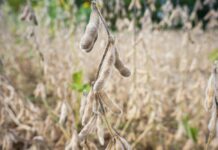COLUMBIANA, Ohio – “How are things in the pumpkin world this morning?” Dave McMaster asks the caller at the other end of his cell phone.
He keeps walking and talking, making his way from a cold storage building to his farm office.
“Are stores still moving ’em pretty decent?”
“Uh-huh. Uh-huh. Good,” he answers with nods and a smile.
He flips the phone closed and charges into the office, just opposite the shut-down sweet corn line, on his Columbiana farm.
The sweet corn wrapped up yesterday, its mid-October run longer than most years.
There’s a little room to breathe now, but buyers are still looking for pumpkins and other Halloween decorations.
McMaster is in full supply.
Demand. Outside he steers a tow-motor like a race car, pulling palleted crates off the trailer and aligning them, edge to edge, inside the cold storage building.
Each crate is loaded with 800 or 1,000 pounds of pumpkins.
The empty trailer pulls away, headed back to the field for a refill.
There are more than 1,000 acres under the McMasters’ control within an eight-mile radius of the farm. About 100 of those acres are in pumpkins.
“We do whatever stores want,” Dave McMaster says, listing a wholesale inventory of Indian corn, gourds, corn stalks, and a bevy of pumpkins.
There are pie pumpkins, white pumpkins, red warted pumpkins, Halloween pumpkins, munchkin pumpkins, we be littles, and spookies.
The choices are endless and reflect years of growing knowledge.
History. McMaster Farms was started three generations ago, in 1943, by Dave McMaster’s grandfather, Albert “Lefty” McMaster.
In the early days the farm did a lot of strawberries and sweet corn, but its main business was potatoes, McMaster says.
The nearby potato chip companies found a good supply on the Columbiana farm. But the family got out of that about 10 years ago, when the economics of it were going downhill.
Those acres didn’t sit idle. While the farm’s potato tradition was dying, its pumpkin legacy was born.
Too many. Dave and Carrie McMaster’s youngest children, Danyelle, 7, and Nicole, 4, would try to carve jack-o-lanterns from every pumpkin that came up the driveway if they could, Carrie McMaster says.
That would make quite a glow on their front lawn, but it’s just not possible.
The girls know it, their older siblings, Rachel, 18, and Michael, 13, and their parents do, too.
One-hundred acres produces tons of pumpkins, even in years like this one, rainy and wet, Dave McMaster says.
Pressure from diseases that thrive in cool, damp weather was strong this year, forcing McMaster and his crews – locals and migratory workers alike – to spray fungicides almost weekly.
That added considerable cost, but didn’t stop the crop.
It was a decent year, the McMasters say.
Harvest. A truck loaded with pumpkins chugs up the gravel lane, a silhouette against sky-high cornstalks.
Tucked behind the row crop is a parcel of pumpkins. The picking crew – Dave McMaster calls them his “great workers” – is hard at it.
It’s supposed to rain tomorrow. Rain makes mud, which makes dirty pumpkins, which makes unhappy buyers.
One employee drives the tractor, towing a flatbed wagon on timeworn paths. Four more employees ride the wagon, perched between and on top of the cardboard cartons.
The last two walk beside the cart, heaving pumpkins of all sizes skyward. The riders catch them, brush off dirt, sort them by size.
“Stores don’t like dirt in their scanners,” McMaster says, nodding toward a change in consumer taste since he’s been in the business.
“[Wholesale] customer loyalty just isn’t like it used to be. They’re here today, gone tomorrow. It’s all about price and quality. If you don’t have it, they’re gone to the guy up the road,” he says.
That threat, that risk, keeps him and Carrie at the top of their game.
They explain to buyers that they don’t make the pumpkins in a mold overnight. Pumpkins take time to grow.
Each one will be colored a little different. Each one is shaped differently. And depending on the time of the season, the quality can vary.
Headed out. Back at the farm, the family’s delivery trucks are reloading for the next day.
Carrie and Dave try to stay ahead of orders, scheduling their drivers to deliver fresh vegetables to 19 local supermarkets and chain stores in Pittsburgh and along the East Coast.
It’s nonstop, go, go, go until the middle of October, Carrie McMaster says, giving credit to friends and family – including Dave’s dad, Jon – who keep their farm going during the season while Dave’s in the field and she’s in the office.
“None of us could do our job without the other,” she admits.
Back at it. It’s almost 10 a.m. and pumpkin-picking crews are already on their way to the fields, directed to pick the big ones, to clean up on this second pass through that field.
Dave’s cell phone ringer tells him he’s got an incoming call. He heads back toward his office.
Halloween is still two weeks away, but it’s prime time for carving jack-o-lanterns and hanging bundles of Indian corn on the front door.
The McMasters are in full supply.
(Reporter Andrea Myers welcomes reader feedback by phone at 1-800-837-3419, ext. 22, or by e-mail at amyers@farmanddairy.com.)
Get 4 Weeks of Farm and Dairy Home Delivered









